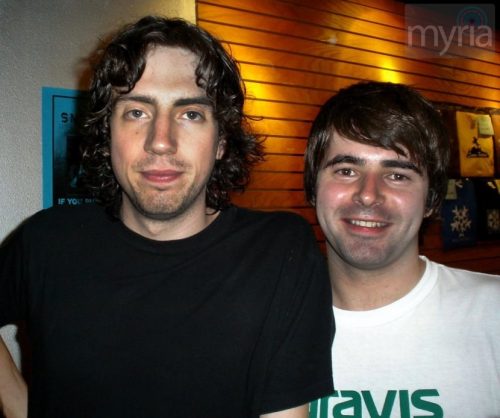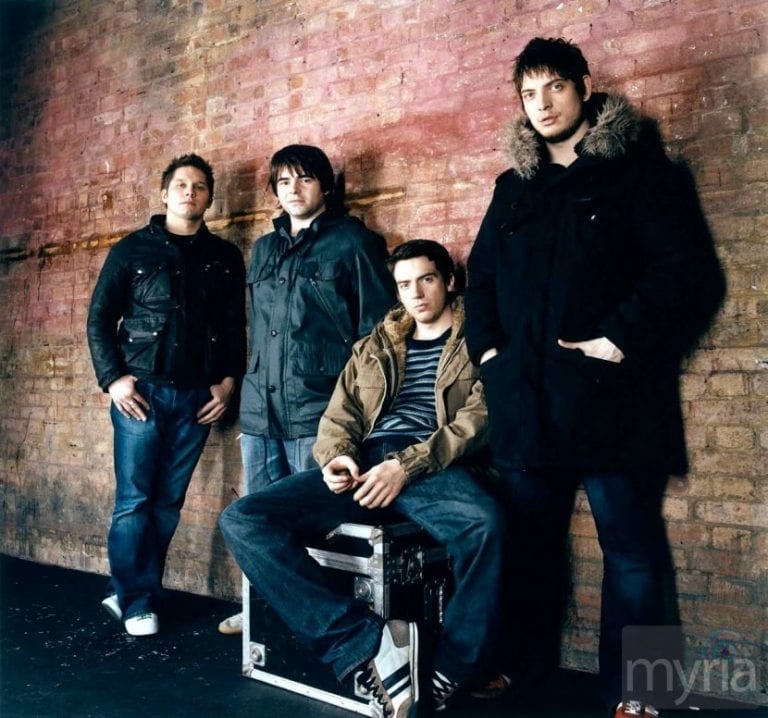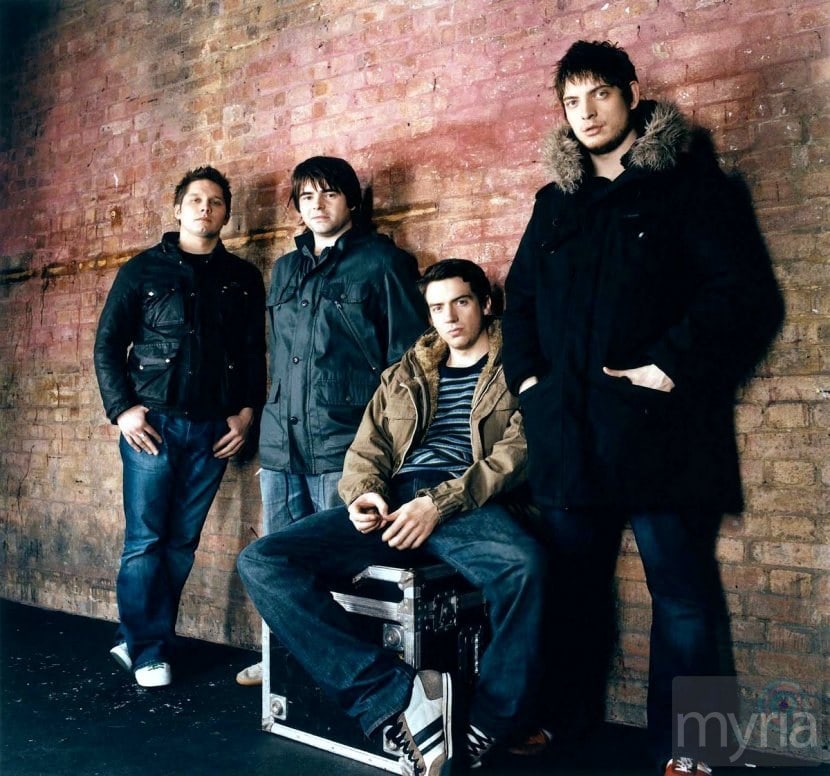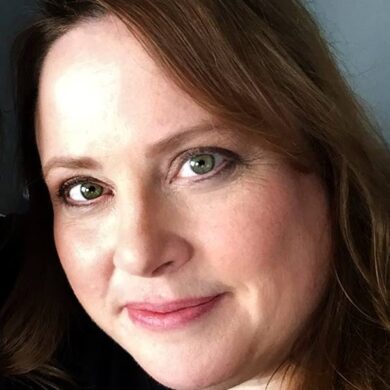Smells like teen spirit
Snow Patrol began in Dundee, Scotland, where McClelland and Lightbody met soon after starting university there in 1994. Not only did they share a love for the same sorts of bands (think Pixies, Sebadoh, Soundgarden), they were also both from Northern Ireland. Another two lads from back home — Quinn and Connolly — rounded out the lineup in 1998 and 2002, respectively.
Like most of the best bands in history, the members of Snow Patrol had fairly lackluster starts to their musical careers. None of them were playing sonatas at age three, and there wasn’t a family friend who knew someone that knew somebody in the business. McClelland’s parents did, however, encourage him to pick up an instrument.
“My parents made me learn the violin from the ages of 7 to 11, and I hated it,” he says. Only some savvy negotiating tactics saved him from possibly becoming a member of pop string quartet Bond. “My dad was a bass player, and I said, ‘If I take up the bass, will you let me off violin lessons?’ And that’s how it happened. I started when I was 10 — just messing about, taught myself. Dad helped a wee bit. That was it.”
The fact that McClelland played for three or four hours every night helped, too. “I went to a school where not many people from my area went to — they all lived about twenty miles away. I didn’t really hang out with that many people, so I could play the bass all the time. Along to Led Zeppelin, along to the Chili Peppers — along to everything.” He laughs, “I think I actually owe my neighbors some recompense for all of that!”
The people next door probably were a little happier when he joined his first band around age 14. “It was when Nirvana came out — I thought ‘I could play these songs.’“ Soon, he started playing regularly with other people. “I got to play in loads of bands, ‘cause nobody plays the bass,” he laughs. “As soon as you get in a band, it’s miles better — you can do a lot more, you learn much quicker, you learn how to play with other people, you learn to listen when you play — it just galvanizes everything. As soon as you join a band, you’ve got something to rehearse for.”
Connolly first got his hands on his own guitar when he was 12 or 13, but, he says, “I didn’t take it seriously ‘til I was 15 or 16 — I was just messing about.” His first real band experience wasn’t for another year or so. “It wasn’t that great,” he snorts when remembering his first group. “You gotta start somewhere, though.”
Both give Cobain and crew props for having an early influence on their careers. Krist Novoselic, in particular, gets a callout from McClelland. When it comes to grooving along to such a talent, he smiles and shrugs, “It’s just how you learn.”
Highway patrol
“We’ve been touring the UK ‘til we were sick of it — all the same venues,” McClelland laughs. “Now we’re not sick of it anymore!” Nor are they sick of criss-crossing America, even though the group has already completed three of four planned tours of the US in support of this album — not counting a scattering of dates for radio station holiday shows.
“America — it’s an obvious thing, but it’s so f*ing big,” says Connolly. “It’s not like the UK, when you can do like seven or eight big shows and then that’s it. There’s one radio station: Radio 1. Over here it’s just completely different — there are thousands of radio stations.” With all those stations out there, and thousands of bands vying for airplay, he realizes that many of the people watching them onstage are only be familiar with one or two songs. “They’re very attentive, because they’re still listening to the album. Some people might just be coming to the shows to see what it’s about, to check it out.”

The band members seem to be the best of friends, and they’re all having the time of their lives — and that vibe may be what helps them connect so well with their audience. With just a quick glance at the message boards on their web site, it becomes clear that many of their fans thrive on analyzing every detail of television appearances and live shows — clucking like mother hens when they note the band’s looking sick or tired, or maybe have some hefty hangovers. They brood about whether or not their record label is pushing the band too hard, and there’s even talk of bringing the group care packages.
While care packages would no doubt be appreciated — particularly if they contain a little something to give the band one of those aforementioned hangovers — fans need not worry that the label is pushing them too much. Truth is, nobody could possibly drive them harder than the band members drive themselves. That’s because the guys in Snow Patrol are absolutely sure that touring is vital to their career. And by “touring,” they don’t mean playing a handful of gigs or even one six-week tour. These four pretty much want to be part-time American residents.
“We’ve heard so many stories of bands coming over [to the US] and destroying themselves. Playing to maybe 20 people, or even coming over and playing three shows — like New York, San Francisco and Los Angeles — and then wondering why they haven’t broken America,” says Connolly. “Bands like U2 and Coldplay are bands that toured their f*in’ asses off.” (Word is that in 2005, Snow Patrol will get to play in support U2 across the states — a lesson from the masters on how it’s done.)
Of his band’s third US tour, Connolly says, “We’ve noticed a big difference from the last time, which is great, you know, ‘cause you can see the record building.” In particular, he singles out Columbus, Ohio, as an example of a particularly memorable gig. “I know it’s a big college town, but the venue was sold out, and it’s somewhere we’d never been.” He shakes his head, clearly still amazed. “We’re all a bit overwhelmed, really.”
If it feels like it works, then it works
The next album is a big question mark — “Can they do it again?” — followed by an exclamation point as a stamp of impatience. Now that the band has a growing following the world ‘round, nobody is willing to wait three years for a follow up to Final Straw.
“Are we working on a new album?” Connolly laughs, like he’s heard this one before. “We’re trying to! It’s just kind of tough on the road. Some bands can do it — it’s just not the way we work.” McClelland explains, “You have to learn how to write again, really, because you haven’t been doing it for awhile.”
“We’ve been on tour really since last August. And especially when you’re on tour, you’ve got to do your press, and then you’ve got sound check, and it’s kind of hard to get time,” says Connolly. “We’ll mess about in sound check and we do have a couple of ideas, but I think we’ll just have to get in a room together for a couple weeks and just start writing them.”
“We get about 30 songs for each album, and then cut it all down,” says McClelland. (“Get rid of the crap,” Connolly interjects.) “At least then you know that you’ve got some sort of quality control.”
Other than that QC check, the two agree that there is no hard and fast rule set that applies to the songwriting process itself, nor is there a particular pecking order. “It changes, it varies — Gary writes all the lyrics. So sometimes he’ll come in with lyrics or a vocal line, and maybe a rough chorus he plays on an acoustic, and that accounts for probably about a third to half,” McClelland says. “The rest of it is jams, or someone else comes in with a chord progression that is great for a verse. We go ‘round and ‘round and ‘round it for like 20 minutes until everyone’s happy with what we’ve got.” The upshot? “It’s just basically — whatever works. It’s a mystery. Songwriting always is.”
S’now and then
Just before this interview, Snow Patrol played a few songs for an audience of one. (I considered it a sort of personal command performance; they called it soundcheck.) While the band was tight, it wasn’t until the show that evening that they truly became electric. Their power onstage is clearly fueled by the heady combination of finally getting off the bus and doing what they do best, and receiving an exuberant response from the audience for their efforts.
To capture some of that energy, cameras rolled during one of their sold-out concerts at London’s Somerset House last August, and thus a DVD was born. In addition to an hour of live footage, the bonus offerings include three videos, a Japanese tour diary, and some extras the band shot during one of their US jaunt earlier this year. (The disc is out now, in stores filed under Snow Patrol Live 2004: Mums and Dads of the World be Patient with Your Children.)
That same parental advisory also shows up on each of their albums and on their web site. Was this phrase something else that sprung from Lightbody’s fertile imagination? Surprisingly, the answer is no. “It was just something Tom Simpson, our keyboard player, said,” McClelland says. “We were going down to finalize our first record (1998’s Songs for Polarbears) in Glasgow, to do all the artwork, and he just said that for some reason. Even though we hadn’t discussed what it meant or anything, it just made sense to everyone, and we’ve put it on every record since.”
So it’s not about some lingering resentment from having had impatient parents?
“No, the complete opposite — probably for all of us,” says Connolly. McClelland nods in agreement, and adds, “They were very patient with the years it took for any success to come — as long as we were happy.”
“I mean, there was the odd wise word,” Connolly concedes with a smile. “‘Maybe you should think about something else,’ you know…” McClelland joins in, “‘If you played the golf club, you’d get 500 quid — all you need to do is learn these Beatles covers.’“ The two share a look and laugh. “That was a lot of the wise words.”
Fortunately, the band never needed to walk down that long and winding road to cover band purgatory. And whether their plea for patience was truly random or actually prophetic, one thing’s for sure: the members of Snow Patrol will never again need to fight over a can of beans.
“We’ve just been pretty lucky with it,” muses Connolly, smiling as he rocks back in his chair.
And the mums and dads? “They’re happy as pie now.”
Snow Patrol were interviewed during the Final Straw tour at the Marquee Theatre in Phoenix, Arizona in 2004, where the second and fourth photos here were taken. This article first appeared on SheKnows.com.










